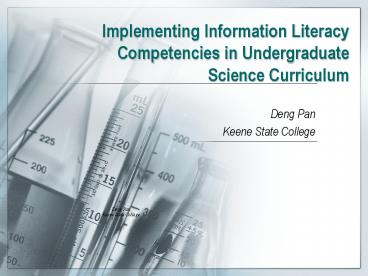Implementing Information Literacy Competencies in Undergraduate Science Curriculum - PowerPoint PPT Presentation
1 / 12
Title:
Implementing Information Literacy Competencies in Undergraduate Science Curriculum
Description:
International Social Science Journal. 53 (2), p. 271-282. 10. Smith, E. M. (2003, Spring) ... Issues in Science and Technology Librarianship. ... – PowerPoint PPT presentation
Number of Views:53
Avg rating:3.0/5.0
Title: Implementing Information Literacy Competencies in Undergraduate Science Curriculum
1
Implementing Information Literacy Competencies in
Undergraduate Science Curriculum
Deng Pan Keene State College
- Deng Pan
- Keene State College
2
Agenda
- Context of information and scientific information
literacy competencies - A collaboration model
- Examples of the implementation
3
What We Need to Think About
- The context of information literacy
4
What We Need to Think About (Cont)
- General information literacy competencies vs.
- Scientific information literacy competencies
- ACRL/STS information literacy standards for
science and engineering/technology
5
Information Literacy Competencies Specific to
Undergraduate Biology Students (Draft)
- Understand the unique characteristics of
scientific literature, including publication
formats, structure of the scientific paper and
peer review - Understand the importance of internal
documentation and citation of relevant literature
- Ability to critically evaluate sources of
scientific information - Understand the ethical, legal and social issues
surrounding scientific information - Ability to interpret and use presentation tools
- Adapted from ACRL/STS standards
6
Triangle Information Literacy Instruction (TILI)
Model
Librarian
Information Literacy Competencies
Students
Faculty
7
Implementation of Scientific Information Literacy
Competencies
8
Information Communication
Topic
References
Research
Secondary Sources
Books
Conference Proceedings
Primary Sources
Edited Volumes
Scholarly Journal
9
Reading Scientific Literature
- Challenge
- Not realize the importance of scientific
literature - Difficult to understand and digest
- Solutions
- Introduce the structure of the paper
- Provoke critical thinking
- Recognize the connection between concepts from
previous knowledge and the ideas in a particular
paper. - Compare the format
- Suggestions
- Select some papers to read
- Kenyon Colleges tutorial and quizzes
- http//biology.kenyon.edu/Bio_InfoLit/index.html
10
Scientific Writing
- Purpose
- Issues of audience and format
- Understand the ethical, legal and social issues
around the information - Future Plans
- More pieces of writing will be integrated
11
References/Further Reading
- Association of College and Research Libraries.
(2000). Information literacy competency standards
for higher education. Retrieved May 24, 2006,
from http//www.ala.org/ala/acrl/acrlstandards/inf
ormationliteracycompetency.htm - American Library Association, Association of
College and Research Libraries, and Science and
Technology Section. (2004). Information literacy
standards for science and engineering/technology.
Retrieved May 24, 2006, from http//www.ala.org/a
la/acrl/acrlstandards/infolitscitech.htm - Carder, L., W., P. Bibb, D. (2001). Case-based,
problem-based learning information literacy for
the real world. Research Strategies. 18, p.
181-190. - Herro, S. J. (2000). Bibliographic instruction
and critical thinking. Journal of Adolescent
Adult Literacy. 43 (6), p. 554- 558. - Jsaak, D. J. Hubert, W. A. (1999). Catalyzing
the transition from student to scientist A
model for graduate research training.
BioScience. 49 (4), p. 321-326. - Leckie, G.J. Fullerton, A. (1999). Information
literacy in science and engineering undergraduate
education Faculty attitudes and pedagogical
practices. College Research Libraries.
60(1)9-29. - National Research Council, Committee on
Undergraduate Biology Education to Prepare - Research Scientists for the 21st Century.
(2003). BIO 2010 Transforming undergraduate
education for future research biologists.
Washington, DC National Academies Press. - 8. Nerz, H. F. Weiner, S. T. (2001).
Information competencies A strategic approach.
Proceedings of the ASEE 2001 Annual Conference,
Albuquerque, NM. Retrieved May 24, 2006, from
http//eld.lib.ucdavis.edu/fulltext/00510_2001.pdf
- 9. Russell, J. M. (2001). Scientific
communication at the beginning of the
twenty-first century. International Social
Science Journal. 53 (2), p. 271-282.
12
Thank You!

